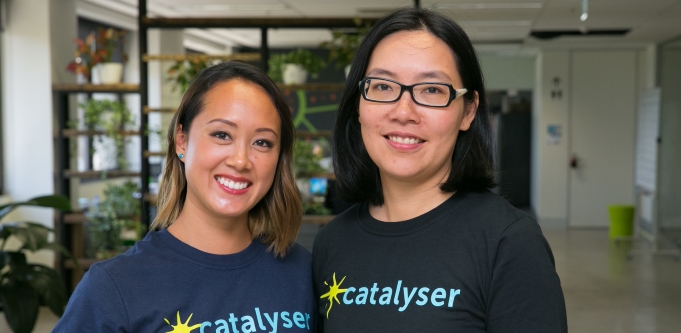
Catalyser founders Angela Kwan and Aivee Robinson. Source: Supplied.
Muru-D, one of Australia’s most prominent and successful startup accelerators, has announced its fifth and most diverse cohort, ushering 10 new startups into the intensive program.
The Telstra-backed program has provided more than $4 million in funding to more than 100 early stage startups since its inception, offering successful applicants $75,000 in seed capital as part of an agreement for future equity.
The new cohort includes startups looking to create autonomous aircraft, cloud-based healthtech, kid-friendly business building platforms, and on-demand parking spaces. Six of the 10 startups in this cohort have female founders, and this time round, the program received 20% more applications from female-led businesses.
Notable alumni from the muru-D program include bron.tech, Flurosat, and Pixc, and more than 15 of the accelerator’s previous startups have gone on to raise more than $1 million.
“It was important to us to select teams that have a social purpose element, using technology in innovative ways to solve real problems and create solutions for societies today and into the future,” muru-D head Julie Trell said in a statement.
“I’m proud that muru-D continues to grow stronger each year and to have many of our alumni companies still actively involved in the program mentoring the next generation.”
Angela Kwan is the founder of Catalyser, one of the startups in the new cohort. Her startup aims to provide a software and services solution to companies to better facilitate employees donating to charities and operating charitable fundraising through the business.
“People want to work for companies with purpose, so we act as a gateway for companies to reflect purpose and build culture through engaging with an employee giving program,” she tells StartupSmart.
“Payroll giving was made possible over ten years ago thanks to tax reform but since then participation rate has been pretty low, and we see it as a great way to foster staff engagement.”
Catalyser already has 15,000 employee users in Australia, and has facilitated over $2 million in charitable donations. Kwan says the aim of joining muru-D for her was not the $75,000 in funding, but the chance to kick-start her company’s growth overseas and into new markets.
Kwan was a mentor for muru-D’s previous cohort, thanks to her background in law. She says she’s looking forward to being on the other side of the table and getting herself into the “driver’s seat”.
Furthermore, the biggest advantage to any startup going through a program like muru-D is the collegiate nature of the cohort, says Kwan. It’s a holistic environment that is empowering and supportive, but where founders still maintain control.
“The great thing about muru-D is that it’s not ‘one size fits all’. While the onus is still on you to succeed, it’s very holistic and supportive. It’s a very collegiate drive, as opposed to being all by yourself like many startup founders are,” she says.
Diversity “exciting”
Muru-D head Julie Trell took over the role in early 2017, after startup industry figurehead Annie Parker left in late 2016 to work on the Lighthouse startup hub in Sydney and more recently, to lead Sydney co-working space Fishburners. Trell comes from a background with SaaS giant Salesforce and Kwan says her presence at the head of the program is “really exciting”.
“For female founders, it’s really exciting to work in an environment that’s diverse in both founders and leadership. Looking at the team, it’s diverse in not just in terms of being female, but in terms of age and the sort of people there, many of them have families,” she says.
“It’s really entrepreneurship beyond the traditional ‘guy in a garage’ stereotype.”
The full list of startups in the new muru-D cohort are:
- AMSL Aero – developing an autonomous two-seat aircraft that can take off and land vertically;
- Catalyser – a software and services solution for companies to better facilitate charitable donations;
- Cookitoo – a platform for cafes, restaurants and caterers to rent out their unused commercial kitchen space;
- iCRM – a cloud software platform that integrates with existing health and medical devices to deliver care and support plans;
- Kiddsbay – kid friendly business building platform;
- Life Skills Group – a digital model to deliver wellbeing programs for primary and secondary students, as well as professional development programs for teachers and staff;
- Neuromersiv – using VR for neuro rehab therapy;
- Share with Oscar – an on-demand platform for sharing private parking spaces;
- SkyGrow – developing autonomous tree-planting robots; and
- vetchat – an online platform connecting pet owners with vets.
NOW READ: An inside look at how muru-D is breeding the next generation of Australian entrepreneurs


COMMENTS
SmartCompany is committed to hosting lively discussions. Help us keep the conversation useful, interesting and welcoming. We aim to publish comments quickly in the interest of promoting robust conversation, but we’re a small team and we deploy filters to protect against legal risk. Occasionally your comment may be held up while it is being reviewed, but we’re working as fast as we can to keep the conversation rolling.
The SmartCompany comment section is members-only content. Please subscribe to leave a comment.
The SmartCompany comment section is members-only content. Please login to leave a comment.